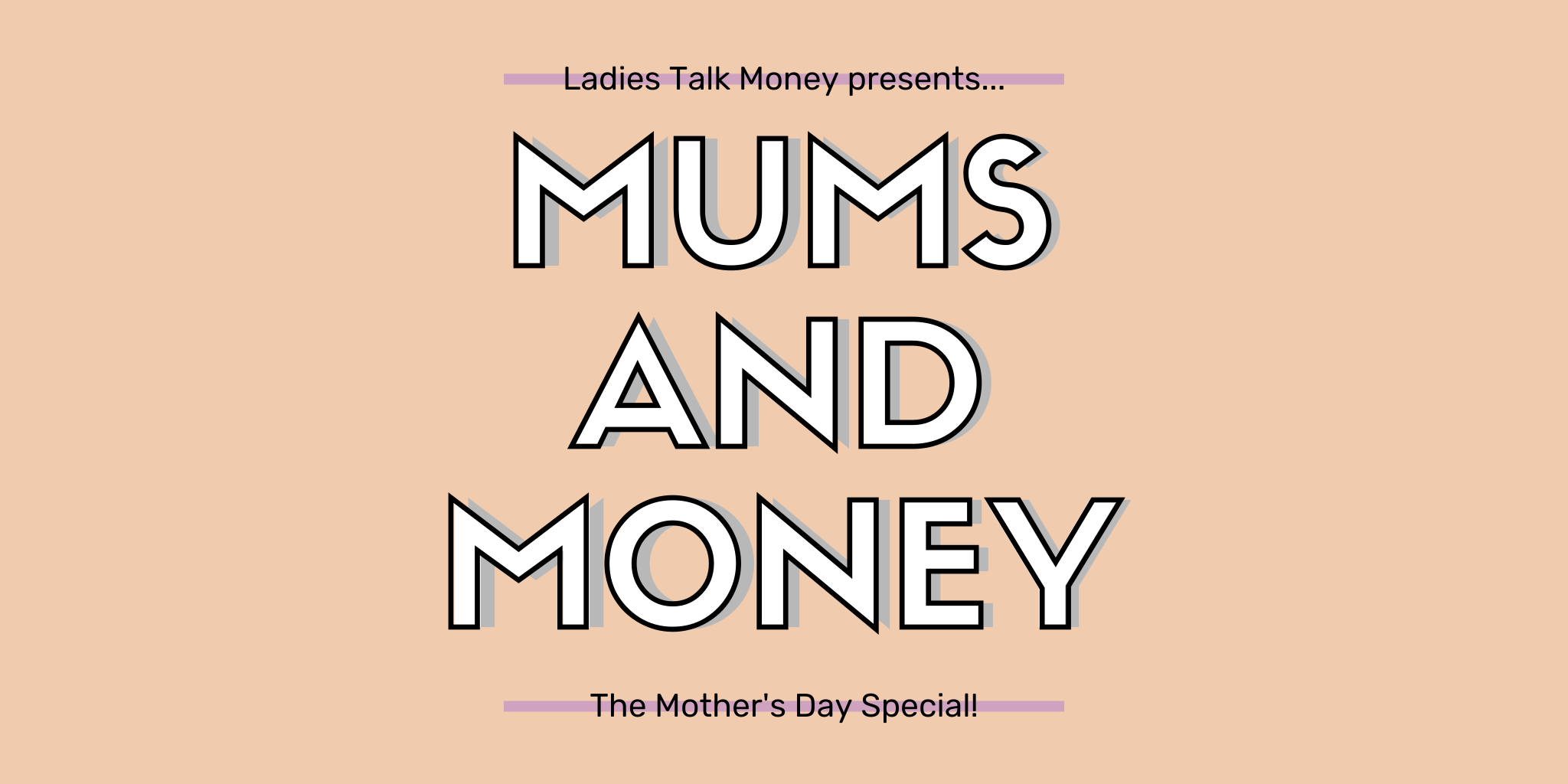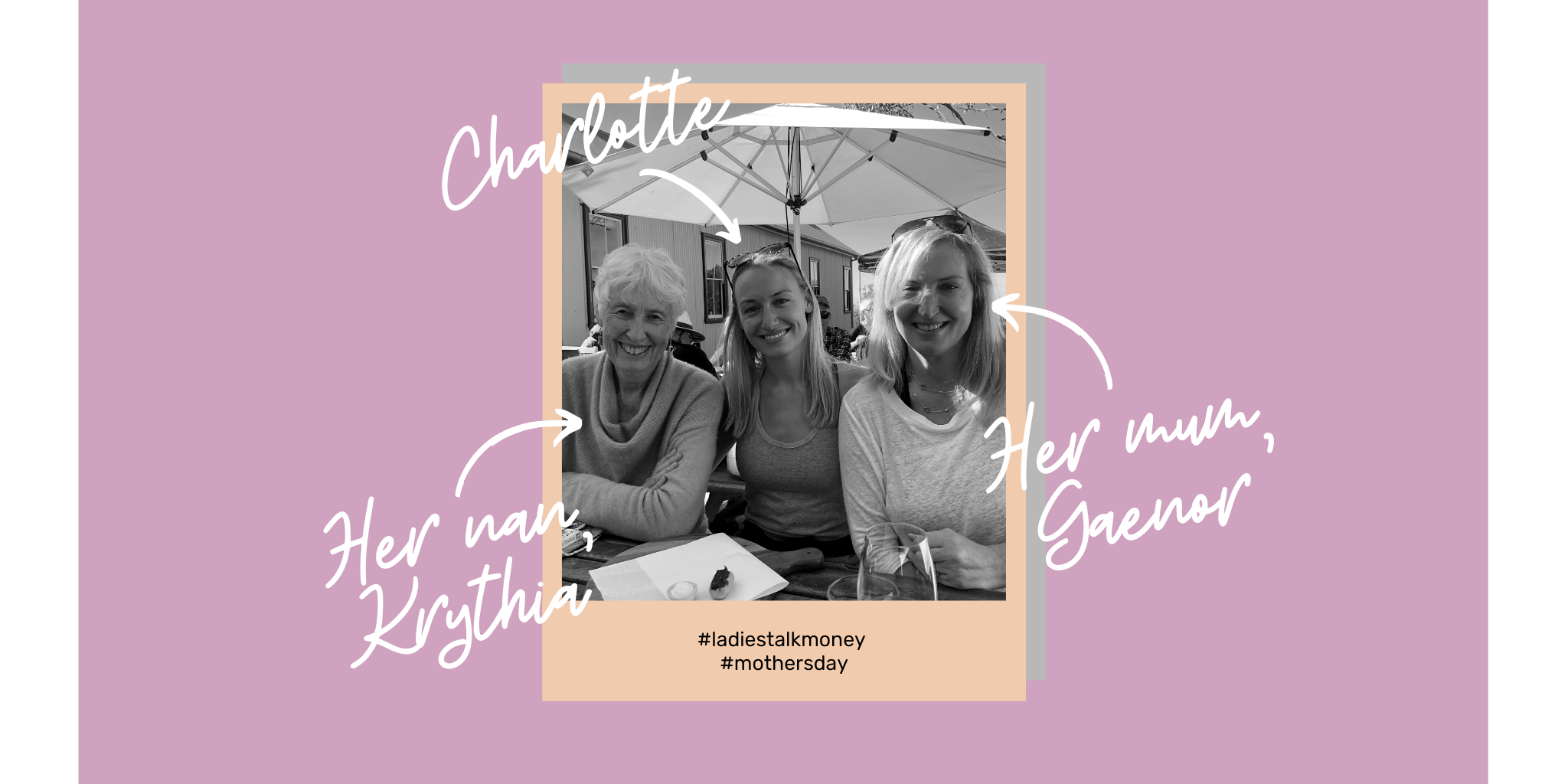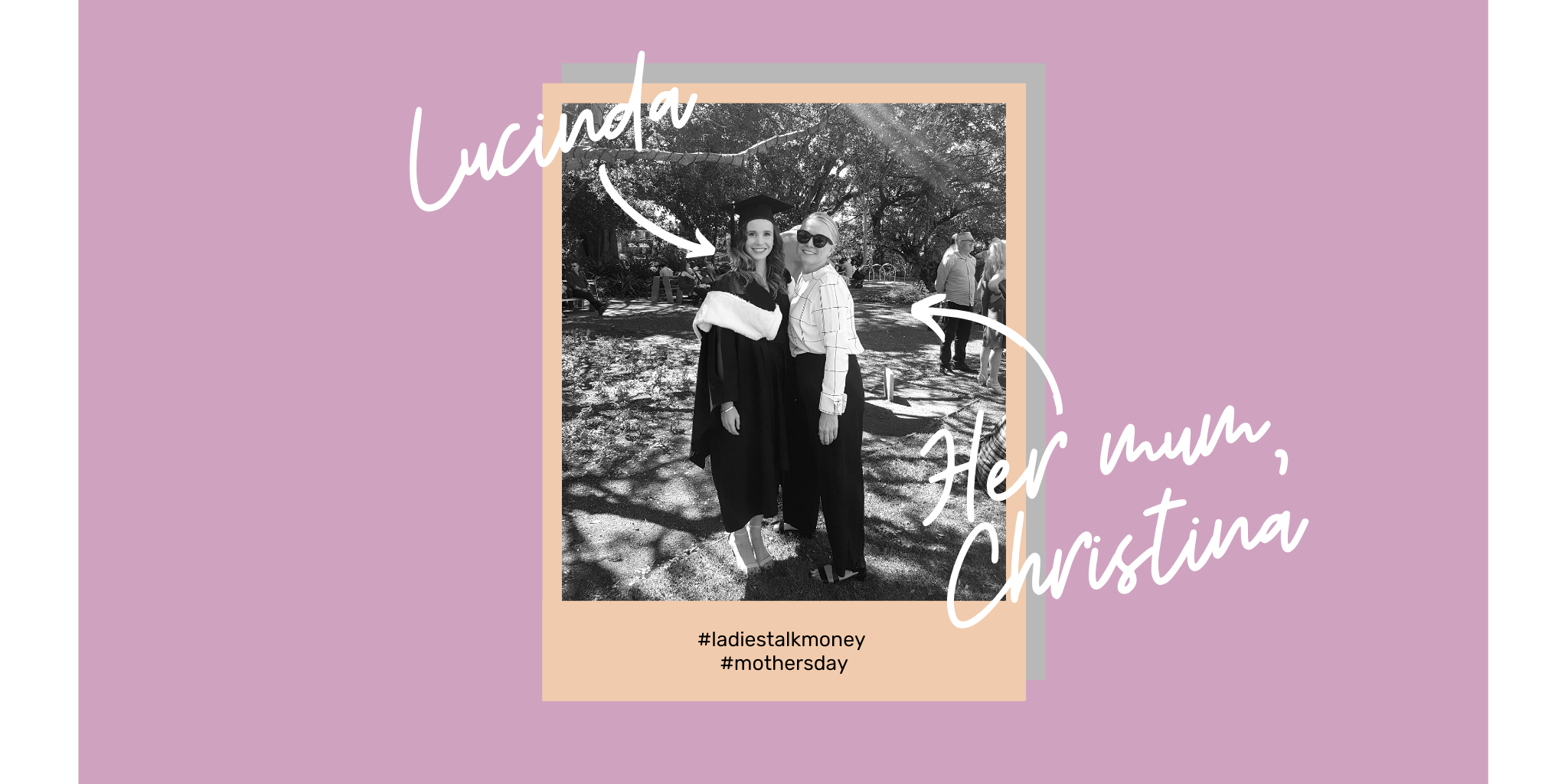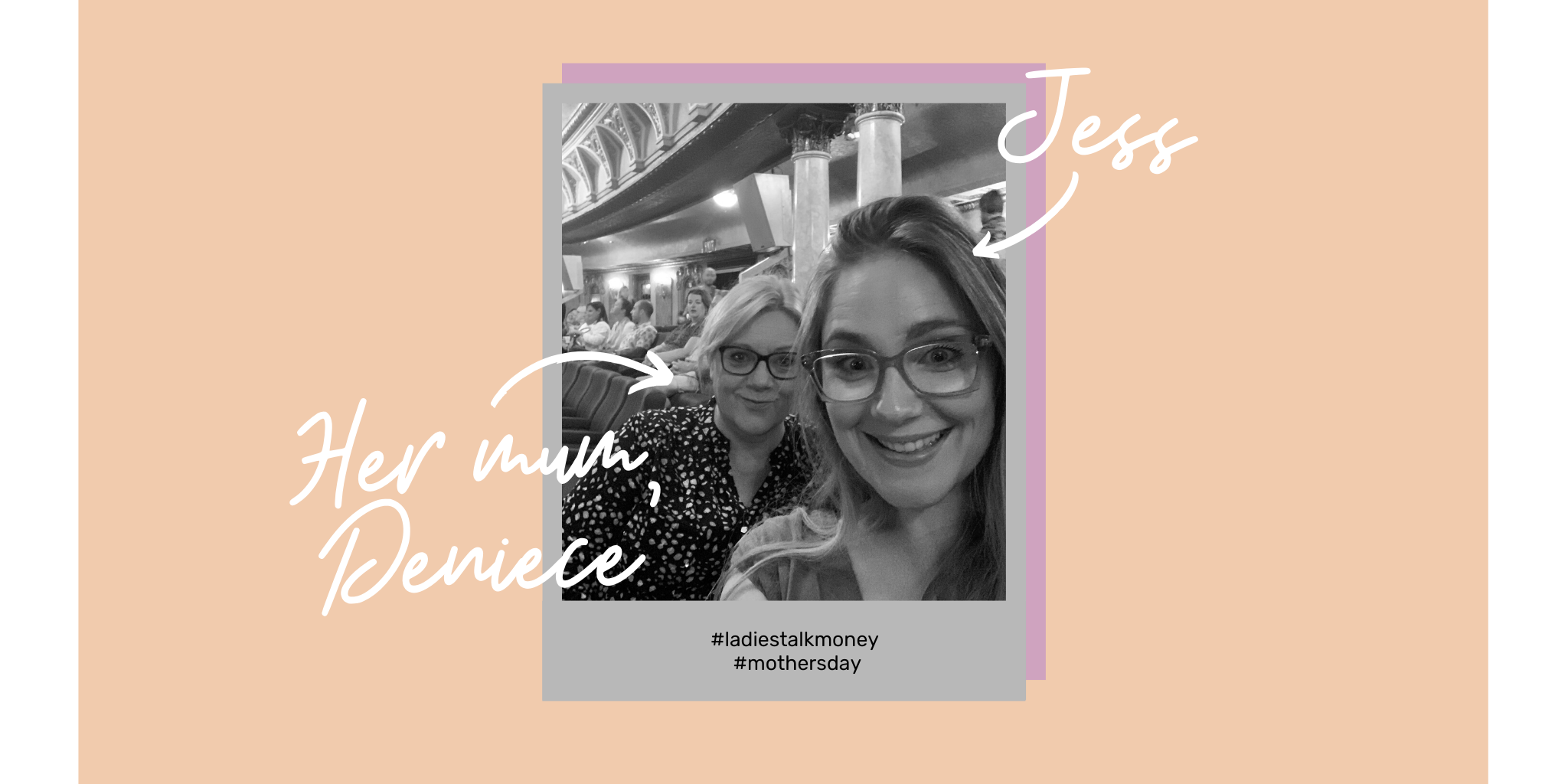Mums and Money - The Mother's Day Special
In honour of Mother’s Day, we sat down with the ladies in our lives to have some open and honest conversations about all things money.
You know by now that our favourite thing to do is support women to talk about money, but we know it’s not always easy. So, this month we wanted to #practicewhatwepreach! In honour of Mother’s Day, we rallied the women working behind-the-scenes here at Ladies Talk Money to have open and honest conversations with their mums and nans about money. From the financial challenges they’ve faced, to the wisdom they’ve learned along the way - we’re a tad excited to present you with: Ladies Talk Money - The Mother’s Day Special.
Before we dive in, we know that Mother’s Day and things to do with our mums can bring up different, and sometimes difficult, things for all of us. Whether your mum is with you or not, whether you’re in touch or not, or whether another person fills that role for you; we see you. And, if this article brings up some complex and challenging emotions for those of us navigating difficult relationships with our ‘mums’ (or our money) - you can reach out to us at hello@ladiestalkmoney.com.au anytime.
For many ladies, what we know (or don’t yet know) about money comes from what we observed and learned growing up and money stories can pass from generation to generation unexamined. Well, we’re ‘bring it into the light’ kinda ladies, so using our ‘How To Talk About Money’ guide for some handy conversation starters, the entire Ladies Talk Money crew sat down with their mums (and a couple of nans!) to talk money. What followed were some incredibly insightful (and sometimes a little painful) truths about money, as well as some sage advice for future generations of ladies. So, grab a cuppa and let’s talk money!
Our Community Manager Charlotte chats money with her mum, Gaenor, and nan, Krythia
Q: What’s the best money or financial advice you have ever received?
Charlotte: You should care about your Super. At the end of the day, your Super is YOUR money and you should care about where it’s invested, the returns, and the fees associated with the fund. Making small changes can make a huge difference if you have the advantage of time.
Mum, Gaenor: Make sure to have a plan, budget and goal, and get into the habit of saving so you put an amount aside religiously.
Nan, Krythia: After speaking with a financial adviser, I borrowed 100K to build a dual occupancy townhouse. Even though I was near retirement, it was the best financial decision I’ve ever made.
Q: What did your parents/grandparents/teachers/first boss teach you about money?
Charlotte: It’s important to have something that is your own and only your own. Whether that’s a separate bank account, an investment property, or even a side hustle. Talk about money and be smart with it.
Mum, Gaenor: Both my parents and grandparents were very careful with money (with the exception of my father who would buy expensive items that he deemed important to him). They saved up for each big-ticket item before they’d purchase it.
Nan, Krythia: I didn’t receive much advice in a direct way. But early on in life, when I was 11-years-old, I learned that money is a common problem in relationships; it causes strife. My parents took on a new business immediately after World War II in 1946, and I was the person who tried to calm the rows over money, which occurred through my early teens.
Q: How has your approach to money changed throughout your life?
Mum, Gaenor: In both my long-term relationships, my husband and my partner were reckless with spending and money in general. Both were very good earners but always spent more than they earned. There was no equality in financial decisions. I was a bookkeeper and took on the role of administration for the entire household. I tried to control the spending, tax payments and budgets. It was exhausting, [and] soul-destroying. I learned money = control, and I had none!
Nan, Krythia: My approach has mainly been a cautious one, although I have taken a couple of big risks (such as buying a property in Mosman at age 65, post-retirement)!
Read Charlotte’s full conversation with her mum and nan on the Fox & Hare blog here or you can watch the video interview here.
Our Communications Strategist & Content Queen Carmen chats money with her mum, Sue, and nan, Pauline
Q: What’s the best money or financial advice you ever received?
Carmen: Most of the important things in life are not ‘things’ at all, but you need ‘enough’ to enjoy your one wild and precious life, and you decide what ‘enough’ is.
Mumma Sue: Isn’t that terrible, I don’t ever remember being given any! But I must have absorbed some because growing up I was always aware of never living in credit, the importance of savings, and only buying what you could afford. ‘You must pay what you owe’ came up, probably as a result of living with a Mum who grew up with debt collectors and therefore never wanting to owe anybody anything. My Dad was also a very strict and disciplined man, being in the Army, and he never wanted to owe anybody anything either.
Nanna Pauline: We weren’t ‘well off’, but my Dad made sure we always had the best of everything, which was great until a few months later there’d be a knock at the door, and someone would repossess the radiogram or whatever appliance it might be. My mother was very matter-of-fact, raising six kids after the First World War and during the Depression, and she had little time for Dad’s antics, so she told me: “debt leads to worry and worry doesn’t make for a happy life.”
Q: How has your relationship with money changed over the years?
Carmen: I used to be so uncomfortable talking about money; I never earned any (volunteering and co-founding a non-profit), and took this unhealthy pride in how little I knew and how little I had. Now, it’s literally all I want to talk about. I want more of it, I want every woman or marginalised group to have more of it, and I want to know everything.
Mumma Sue: Ever since I got my first paycheck in a yellow envelope when I was a teenager, I didn’t know what to do with it. All of the jargon made me feel stupid and I reviled talking about money. So, I pretended I didn’t have time to worry about it and got my husband to take care of it for me. Over time, it became a habit and it cost me, dearly. I hated feeling stupid, and it made me angry (and still does) that there was language used that made me feel that way.
As life wore on, I wanted to be financially independent but I felt like I’d missed the boat. I panicked because I had no financial independence and lost all my confidence. By the time I was 40, despite the fact that I could run a ventilator in ICU [as a nurse], I didn't have the courage to admit I couldn't do my banking. Then when computers came along, it became a double whammy - the barriers got too high. I know this sounds awful but I used to secretly wish that, if a banker was going to have a heart attack, they would do it in front of me so I could save them and they would see I wasn’t stupid.
Q: If you could give one piece of financial wisdom to future generations, what would it be?
Mumma Sue: Don’t be belittled by people who have a handle on the finance world.
Nanna Pauline: Live within your means and don’t spend more than you can afford.
Carmen: Think about who benefits from you being uncomfortable, lacking in confidence, or not engaging with your money. Hint: it’s not you... If you’re fine with that, and are happy to put more power in those people’s hands, unlikely but ok. If you don’t, and you want it to change, then you need to take that power back and get your financial sh*t sorted. The good news is, you don’t have to do that alone.
Read Carmen’s full conversation with her mum and nan on her blog here.
Our Wordsmith Lucinda chats money with her mum, Christina
Q: What did your parents/grandparents/teachers/first boss teach you about money?
Lucinda: The first memory that comes to mind is my parents banging on about putting a bit of money away from every paycheck and the importance of saving every week. Even when I was only earning a bit of cash for doing odd jobs around the house, Mum and Dad would encourage me to save it and keep it aside for a rainy day (something I always found hard to do!).
Mum, Christina: I learned from observing the trials and tribulations of my parent's lives that curveballs will always come our way. So, always have an emergency fund or separate bank account to tide you over. Also, financial adversity teaches you the fine art of thriftiness!
Q: How has your approach to money changed throughout your life?
Lucinda: Growing up, I never paid much attention to money. Even though we were a single income household, we had credit cards around and my parents didn’t hold back on using them to fund weekends away and new wardrobe purchases. Once I moved out of home at 19, I realised I couldn’t keep my head in the sand about money forever. But it took me years to be proactive about my finances. I spent my time at uni working casual, cash-in-hand ‘hospo’ jobs and spending every dollar I earned. I never checked how much I was being paid, or if my employers were contributing to my super on-time (spoiler alert: they weren’t).
Fast forward to now, and I’ve started to realise the importance of being accountable and in control of my finances. After ditching a stable 9-5 job for freelancing, I developed a newfound appreciation for money and its ability to create freedom and the lifestyle that I want. I take pride in budgeting and having a sustainable cash flow plan, and have even dipped my toe into the world of investing. My partner and I are really open about our finances and long-term goals, which has helped me feel excited and empowered about my financial future.
Mum, Christina: It took me a while to become financially mature. From living paycheck to paycheck in my youth (counting spare change at the end of the week to buy food!) to splashing out and ‘wasting money’ when my husband earned a very good wage (my overly materialistic phase) to now, where my whole world values have changed and I take delight in thriftiness and l am less interested in buying more ‘stuff’.
Q: If you could give one piece of financial wisdom to future generations, what would it be?
Lucinda: Don’t wait until you’re earning a big salary to give a damn about your finances. Start now and create good money habits that you can carry with you in the decades to come.
Mum, Christina: As we all are becoming keenly aware - we live on a finite planet with finite resources. Live within your means, take what you need (not what you want), reuse what you can, share what you have and be aware of what your money and investments do in regards to the health of our planet!
Read Lucinda full conversation with her mum on her blog here.
Our Co-Founder and financial adviser, Jess, chats money with her mum, Deniece
Q: What did your parents/grandparents/teachers/first boss teach you about money?
Mum, Deniece: From a very young age (before I was even 10-years-old), my father drilled into me the importance of money. He used to always say to me, “money makes the world go round”. My mother would spend lots of money on having a lot of ‘things’, because during the war when she was going up, things were so scarce.
Both of my parents worked while I was growing up, and my mother had a very good job as a financial manager for a global company. That was really different from the norm of the time, with most other mothers staying at home (with only a handful of working mothers). She ran the family finances and that taught me how to respect money, and it’s always made me want to be involved in the financial management of my own household.
Jess: I remember my grandparents being very cautious about money and always being focused on having ‘no waste’. I’d say they were the world’s best hoarders.
Q: What’s the best money or financial advice you have ever received?
Jess: I talk about money all day, every day, so I’m more interested to hear what Mum thinks!
Mum, Deniece: Probably to salary sacrifice, to invest in shares, and make additional contributions to my super fund. And, always remember that money doesn’t buy happiness.
Q: What have been some of the biggest financial challenges in your life?
Mum, Deniece: Being a widow at 25 with a four-month-old child. Luckily, my husband had taken out insurance and I think I had $25,000 that was left in my name. A big chunk of that went to the funeral expenses and moving back to Australia from New Zealand. That was definitely a very challenging time for me, but I got through it.
In my second marriage, my husband injured his back right after I had my son, so I had to go back to full-time work very shortly after giving birth. Beforehand, I had been planning to take a long time off, but then a friend suggested that I consider going back to work and it turned out to be a really good decision and a helpful piece of financial advice.
I’m a huge advocate for insurance because I’ve lived through the benefits of having it. In fact, my first husband only took out insurance a few months before he became sick and it turned out to be such a wonderful gift for us.
Read Jess’ full conversation with her mum on the Fox & Hare blog here.
Our Co-Founder and Loan Adviser Chandel chats money with her mum, Victoria
Q: What’s the best money or financial advice you have ever received?
Mum, Victoria: I can’t remember exactly where I heard it, I think it was on TV, but I remember hearing a financial adviser say you should try and save 15% of your wage every week. I mean I didn’t necessarily do that (laughing) but I have always been a very good saver, even when I was still in high school. I worked 2 jobs before I’d even left school, and I’ve been saving since then. I actually paid for an overseas holiday with a friend at 16. I was never given any money from my mum or dad, because they didn’t have any money themselves!
Chandel: Well obviously, I work in finance now, and I’m surrounded by financial and money advice almost every day, but growing up, the only person I ever spoke about money with was you really. So the only financial learning I ever got back then, was from you. And you were always very vocal about money in our household, and how important it was to always be saving and to never spend beyond your means.
Mum, Victoria: Yeah, mainly for me it’s saving. Always save something, even if it’s just a little bit each paycheck.
Chandel: Yeah, although something we talk a lot about with Ladies Talk Money is that a lot of women do get that advice, and understand that, but we often miss out on the advice to then invest those savings so that it grows.
Mum, Victoria: Oh definitely. I mean if you can afford to buy a property then you should absolutely do that. Even if you can’t afford to buy something where you live, you can rent where you want to live but invest in real estate where you can afford.
Q: What did your parents/grandparents/teachers/first boss teach you about money?
Mum, Victoria: Nothing. If anything, they taught me how not to be. We never had a lot of money growing up, and I just always knew that I never wanted to be like that.
Chandel: Yeah this is really interesting because a lot of people, particularly when it comes to money, can end up becoming what they’ve learned. So for example, if they grew up with parents that weren’t very good with money, who taught them bad money habits or didn’t give them any good advice, often they can end up struggling with money themselves when they get older. But you’re one of those people that went the opposite way.
Mum, Victoria: Well yeah, my parents never had much money. Mum didn’t work and dad didn’t have an overly large income, so they never earned much. I just always knew I was going to have to take care of myself financially.
Chandel: Actually that’s something I’ve also learned from you. Even though it wasn’t true for me like it was for you (because you and dad did give us money growing up) but more the idea that I need to take charge of my own finances early. You can’t rely on anyone else, nor should you really. I learned everything from you, to be honest. I don’t really know anyone in my life that’s better with money than you are.
Mum, Victoria: (laughing) Well, thank goodness for that.
Q: How has your approach to money changed throughout your life?
Mum, Victoria: Well, because I became so busy with you girls when you were born (Chandel has a sister, Maquel) I really took my foot off the peddle with money and stopped being so involved with it all. And I really wish I hadn’t, because we had a few money disasters during that time.
Chandel: Yeah, and I’d say you’re not alone here. I think it’s really, really important that we start supporting women more so that they don’t feel like they have to give away the control of their money just because they become mothers. Or, because they get married!
Mum, Victoria: Yes, I just wish i’d always kept some level of control over the money, and that i hadn’t ‘checked out’ so much for all those years. But apart from that, my approach to money hasn’t really ever changed. I spent a lot more when you girls were little because i wanted to spoil you, but that’s about it.
Chandel: (laughing) Yeah, I’d say most of that money was spent on all my dancing and singing and acting lessons and costumes!
Mum, Victoria: Oh definitely… but you know, you can’t take money with you, I don’t regret anything.
Chandel: I think the only thing that has changed with my approach to money is that I want to do more with my money now, so that I see the benefits later on. So, I’m thinking a bit more long term these days. But honestly, I think that’s only come about because I’ve been exposed to the right advice, and I guess that’s what we’re trying to do for other women with Ladies Talk Money.
Read Chandel’s’ full conversation with her mum on the Pure Finance journal here.
There you have it: Ladies Talk Money - the Multi-generation Edition!
Two things became crystal clear from all of our conversations with our mums and nans. The first is that talking to women who’ve come before us helps us to understand where our money stories come from, and can help us heal, challenge or reexamine why we feel the way we do about money. The second is that talking to other women about money deepened our collective commitment to building this wonderful and supportive Ladies Talk Money community. These conversations are so needed. They are world-changing. They are revolutionary. And, while our five stories are by no means representative of every ladies’ relationship with the women in their life or with their money; the more conversations we are having about money - the better.
We hope that these stories encourage you to download our How to Talk About Money Guide and have a conversation with your Mum, Nan, Mother-in-law, Aunty, or Mentor, about money. Better yet, share it with us! Email it to us at hello@ladiestalkmoney.com.au or post it on Facebook or Instagram and tag @ladiestalkmoney.






